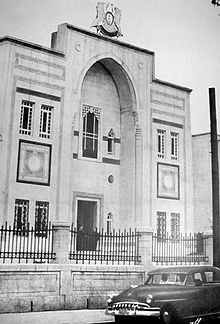People's Council (Syria)
| Basic data | |
|---|---|
| Seat: | Damascus |
| Legislative period : | 4 years |
| First session: | 1973 |
| MPs: | 250 |
| Current legislative period | |
| Last choice: | 2020 |
| Chair: | Hammuda Sabbagh |
| Distribution of seats: |
|
| Website | |
| www.parliament.gov.sy | |
The People's Council ( French Conseil du peuple , Arabic مجلس الشعب, DMG maǧlis aš-šaʿb ) is the parliament in the unicameral system of Syria . It meets in the Syrian capital Damascus . His influence on Syrian politics is generally assessed as non-existent. The role prescribed in the constitution is not exercised due to the lack of fundamental constitutional standards.
250 members are elected to the Syrian parliament for four years each. The Syrian Constitution stipulates that 127 seats will be allocated to the party that represents “the interests of the working class ”. The Ba'ath Party makes this claim . The parliament thus consisted of 51% MPs from the Baath Party and 49% independent and fairly freely elected MPs. The National Progressive Front , which functions as a coalition of the Baath and bloc parties, dominates parliament . There is therefore a de facto one- party system , since the bloc parties are dependent on the Ba'ath Party through the National Progressive Front.
On May 24, 2012, Muhammad Jihad al-Lahham was elected President of Parliament. Since September 28, 2017 it has been the Orthodox Christian Hammuda Sabbagh .
composition
The last election took place on April 16, 2016 . The distribution of seats is shown below.
| Political party | proportion of | Seats | Inside | |
|---|---|---|---|---|
| National progress front | 100% | 200 | ||
| 172 | ||||
| 7th | ||||
|
3 | |||
| 2 | ||||
| 2 | ||||
|
1 | |||
| 1 | ||||
|
12 | |||
| Independent | 50 | |||
| total | 250 | |||
| Source: IPU | ||||


